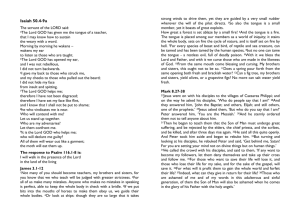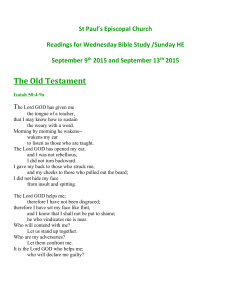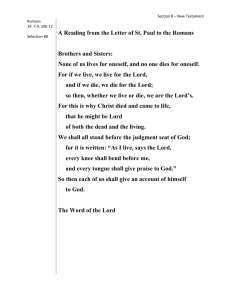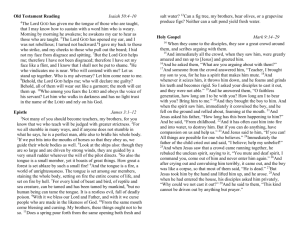Enter Rumour painted full of Tongues
advertisement
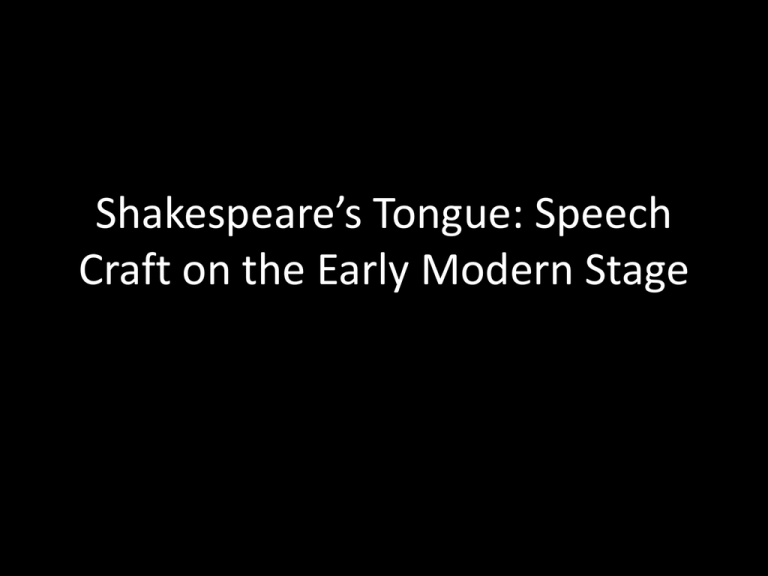
Shakespeare’s Tongue: Speech Craft on the Early Modern Stage Cesare Ripa, Iconologia, ‘Ragion di Stato’ Queen Elizabeth I The Rainbow Portrait Isaac Oliver, ca. 1600 Virgil’s Aeneid, ‘The House of Fame’ Enter Rumour painted full of Tongues Stage Direction, Henry IV Part 2 Katherine: Why, sir, I trust I may have leave to speak, And speak I will. I am no child, no babe. Your betters have endured me say my mind, And if you cannot best stop your ears. My tongue will tell the anger of my heart Or else my heart concealing it will break. And rather than it shall I will be free Even to the uttermost as I please in words. Petruchio: Why, thou sayst true. It is a paltry cap. The Taming of the Shrew, 4.3.73-81 FIRST CITIZEN: Once, if he do require our voices, we ought not to deny him SECOND CITIZEN: We may, sir, if we will. THIRD CITIZEN: We have power in ourselves to do it, but it is a power that we have no power to do. For, if he show us his wounds and tell us his deeds, we are to put our tongues into those wounds and speak for them. So if he tell us his noble deeds, we must also tell him our noble acceptance of them. Coriolanus 2.3.1-9 What said he? Polonius in Hamlet, 2.1.87 There’s matter in these sighs, these profound heaves; Your must translate.’Tis fit we understand them. • Claudius in Hamlet, 4.1.1-2 …Tereus took the lady by the hand… …he shut her up, and therewithdal bewrayed His wicked lust…And alone he vanquished her… [Philomela said]: … O perjured wretch…I myself thy doings will bewray. …them blaze I will In open face of all the world … my voice the very woods shall fill And make the stones to understand. Let heaven to this give ear, And all the gods and powers therein, if any god be there. The cruel tyrant, being chafed and also put to fear With these and other such her words, both causes so him stung That, drawing out his naked sword that at his girdle hung, He took her rudely by the hair… But as she yearned … And strived to have spoken still, the cruel tyrant came And with a pair of pinions fast did catch her by the tongue And with his sword did cut it off. The stump whereon it hung Did patter still. The tip fell down and, quivering on the ground, As though that it had murmured it made a certain sound. Ovid, Metamorphoses Book VI (tr. Arthur Golding, 1567) Tongue Lingua Lingual Language Lingo Linguaggio Linguistic Loquacious Eloquence Scold’s bridles or ‘branks’ ‘You will never take [a woman] without her answer unless you take her without her tongue’, Rosalind (as Ganymede), As You Like It ( 4.1.161) ‘Do you not know I am a woman? When I think I must speak’, Rosalind (as Rosalind), As You Like It (3.2.241-2) HAMLET: • • • • • • • • • • • • • • • • • • • • • • O that this too too solid flesh would melt, Thaw, and resolve itself into a dew; Or that the Everlasting had not fixed His canon 'gainst self slaughter! O God, O God! How weary, stale, flat, and unprofitable Seem to me all the uses of this world! Fie on't, ah fie, fie! Tis an unweeded garden That grows to seed: things rank and gross in nature Possess it merely. That it should come to this. But two months dead -- nay, not so much, not two -So excellent a king, that was to this Hyperion to a satyr; so loving to my mother That he might not beteem the winds of heaven Visit her face too roughly! Heaven and earth, Must I remember? Why, she would hang on him As if increase of appetite had grown By what it fed on, and yet within a month -Let me not think on't; frailty, thy name is woman – A little month, or ere those shoes were old With which she followed my poor father's body, Like Niobe, all tears, why she, even she -O God, a beast that wants discourse of reason Would have mourned longer! -- married with mine uncle My father's brother, but no more like my father Than I to Hercules; within a month Ere yet the salt of those most unrighteous tears Had left the flushing of her galled eyes. She married. O most wicked speed, to post With such dexterity to incestuous sheets! It is not, nor it cannot come to good. But break my heart, for I must hold my tongue. [Enter Horatio ... ] Worcester: Our house, my sovereign liege, little deserves The scourge of greatness to be used on it, And that same greatness too which our own hands Have holp to make so portly. Northumberland: My lord – King Henry: Worcester, get thee gone, for I do see Danger and disobedience in thine eye. O sir, your presence is too bold and peremptory And majesty might never yet endure The moody frontier of a servant brow. You have good leave to leave us. When we need Your use and counsel we shall send for you. [Exit Worcester] You were about to speak. Northumberland: Yea, my good lord. Those prisoners in your highness’ name demanded Which Harry Percy here at Holmedon took, Were, as he says, not with such strength denied As was delivered to your majesty, Who either through envy or misprision Was guilty of this fault, and not my son. Hotspur: My liege, I did deny no prisoners; But I remember, when the fight was done When I was dry with rage and extreme toil, Breathless and faint, leaning upon my sword, There came a certain lord, neat and trimly dressed, Fresh as a bridegroom, and his chin, new-reaped Showed like a stubble-land a harvest-home. He was perfumed like a milliner, And ‘twixt his finger and his thumb he held A pouncet-box, which ever and anon He gave his nose and took’t away again – Who therewith angry, when it next came there Took it in snuff– and still he smiled and talked; And as the soldiers bore dead bodies by, He called them untaught knaves, unmannerly To bring a slovenly unhandsome corpse Betwixt the wind and his nobility. With many holiday and lady terms He questioned me; amongst the rest demanded My prisoners in your majesty’s behalf. I then, all smarting with my wounds being cold – To be so pestered with a popinjay – Out of my grief and my impatience Answered neglectingly, I know no what He should, or should not – for me made me mad To see him shine so brisk, and smell so sweet And talk so like a waiting gentlewoman Of guns, and drums, and wounds, God save the mark! And telling me the sovereign’st thing on earth Was parmacity for an inward bruise, And that it was a great pity, so it was, This villainous saltpetre should be digged Out of the bowels of the harmless earth, Which many a good tall fellow had destroyed So cowardly, and but for these vile guns He would himself have been a soldier. This bald, unjointed chat of his, my lord, Made me to answer indirectly, as I said, And I beseech you, let not his report Come current for an accusation Betwixt my love and your high majesty. BLUNT: The circumstance considered, good my lord, Whate’er Lord Harry Percy then had said To such a person, and in such a place, At such a time, with all the rest retold May reasonably die, and never rise To do him wrong or any way impeach What then he said, so he unsay it now. KING HENRY: Why, yet he doth deny his prisoners ….


